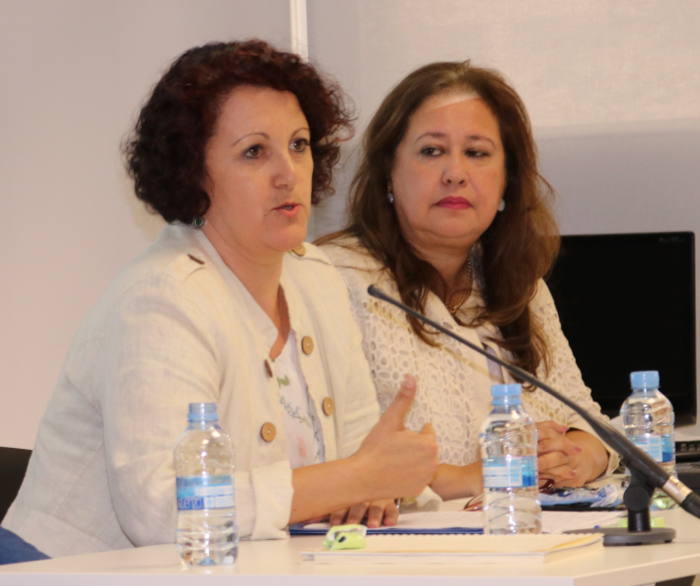-
04 October 2018
Category : Interview
“The aim of the assessment is to design programmes that reach the public”
Janet López, director of management and assessment with the Uruguayan Office of Planning and Budgets, and Teodora Recalde, director-general for budgets with the Paraguayan Ministry of Finance, recently presented their experience of assessment in their respective countries. Both institutions work with the EVALÚA project to improve the impact of various public policies on the public
 Janet López and Teodora Recalde at a presentation of their experiences with assessment
Janet López and Teodora Recalde at a presentation of their experiences with assessmentWhat is being assessed?
Janet López: In Uruguay, we are now tackling the Casavalle Plan, which is a comprehensive policy and a demand that has to do with policies of inclusion. It is a project being developed by Montevideo City Council that has had input from various ministries, which have submitted different policies.
A comprehensive policy consists of input from a variety of stakeholders, from our Ministry of Social Development and Montevideo City Council: in regard to infrastructure, the housing sectors, how overall development is applied to sport and culture as an essential part of the development of a society. These different lines make this a comprehensive policy.
We are now gathering new data to check how this policy has progressed.
Teodora Recalde: In Paraguay, we started a process of performance budgeting in 2011. We began by introducing three types of performance indicators, public programme assessments and a management balance sheet. We are working very hard on the institutional assessment and starting to evaluate the designs and results of the different programmes, such as the agriculture programmes, judicial and prison programmes, health programmes and other institutions that have specific programmes.
Why is the assessment necessary? What is the objective?
J.L: The assessment is part of a long-term strategy. We are working on the entire public management cycle: planning, budgeting, monitoring and evaluation. Assessment was the final stage that we included.
The unit that I manage was created 10 years ago and maybe, a little over 10 years ago, no one even talked about assessment. So, as part of the entire public management cycle (planning, budgeting, monitoring and evaluation) the assessment unit was created in 2011. We started doing internal training and now we are tackling a variety of interventions in public assessment.
The fundamental objective is to improve management. This is not a punitive assessment; this must be made clear to the parties involved. It must really contribute to improving management and, in the end, to the use made of public resources
T.R: The purpose of the assessment, from the viewpoint of the budget and the Ministry of Finance, is to design programmes that will reach the public, and for the programmes that are implemented through the budget to have an impact and to look at where the investment is going.
What does EVALÚA offer as a project?
J.L. Casavalle is not the first project on which we have worked with EVALÚA. We have been doing this for some time and I think that EVALÚA contributes technical expertise, from support for reviewing all the terms of reference to the support that the administration of FIIAPP is providing us with. In turn, the exchange that EVALÚA makes possible with other countries in Latin America involved in the project also adds value. Exchanging the different viewpoints that we all have adds value.
T.R. For us, the EVALÚA project is a mainstay; there are comparative advantages in the complementarity between countries. They have created a new work scheme by stimulating the relationships between professionals in different departments, whether the planning department or the financial department, like ours, and an instrumental and methodological contribution to assessment.
What is it like working with EVALÚA?
J.L. To explain what it is like working with EVALÚA I could give examples of many activities. I could emphasise the exchanges and the formation of a common working agenda; the review of assessments that were made in another country and the expertise of the various technicians also add value. That is one aspect and we in particular are working on a monitoring and assessment skill development plan that, we understand, is part of having a nationwide and international language in common with the countries that are involved.
T.R. There are assessments that have already been made with other countries. In particular, in Costa Rica, we worked on the terms of reference for starting assessment and adopting these types of assessment models in that country. For us, this is an advanced process since we are just starting it.
What are the benefits for the public?
J.L There is going to be a direct benefit because what we want to do is to evaluate the real impact of the different policies and approaches that have existed in the region. And we are also going to work on consultative workshops with civil organisations. This will also bring about a result, feedback so that we can see where things must be improved or what to focus on.
T.R. The public will benefit as these programmes will be well designed and the services properly delivered, there will be a direct impact on the public.
In the assessment, viewed from a financial and budgetary point of view, the debate is where to cut resources. One never knows where to cut, so an evaluation is necessary. As you evaluate, you know where to invest. Because, if you invest well, the budget really reaches the public.
The views and opinions expressed in this blog are the sole responsibility of the person who write them.






